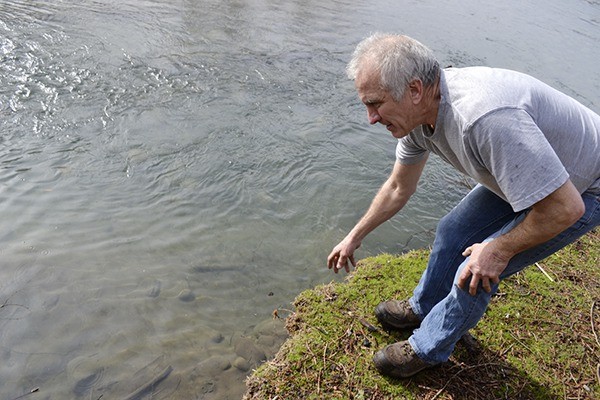A restoration effort begins soon following the departure of tenants living near and in the path of the Dungeness River.
Matt McWilliams, 60, said he and his family and neighbors would vacate their rental homes on March 1 at Serenity Lane, about 2.5 miles south of U.S. Highway 101 off River Road. They received a 20-day vacate notice from the Jamestown S’Klallam Tribe that ended on Feb. 29 and they were readying to stay in hotels the following day, he said.
The tribe intends to restore the floodplain for salmon habitat as part of its ongoing Dungeness Floodplain Restoration Project after purchasing 20 acres from the Robinson family in Seattle, which includes McWilliams’ rented home, for $1,218,000 using the state’s Salmon Recovery Funding Board grants and just over $204,000 in matching funds.
The effort, tribe officials said, benefits Endangered Species Act-listed chinook salmon, bull trout, summer chum salmon and steelhead fish species along with coho, pink and fall chum salmon.
Robert Knapp, Jamestown habitat restoration planner, said they still are in negotiations to purchase nine more neighboring acres from two different property owners.
“We’re hoping to have an agreement soon,” he said.
The project will retire six development rights, move four residences from harm’s way, remove infrastructure from the floodplain and preserves floodplain habitat and salmon habitat-forming processes. After the homes are emptied, excavation crews will remove the structures quickly and carefully, looking for and removing asbestos, Knapp said.
Tribal officials plan to install native plants in areas not already taken by the river.
McWilliams, who lived in a rental home along the river for more than three years, fought the river cutting into his backyard by placing logs and debris in the water and by channeling the current elsewhere. However, his back porch continues to dangle over water and may have fallen in if not for support wires he installed.
He and neighbors have been offered comparable dwellings through Epic Land Solutions, a contractor for the tribe, to rent or buy similar homes, but they haven’t accepted any offers as of March 1.
Once a home is found, the tribe will pay rent if it’s more than the tenants’ current rent for 42 months or in an equal lump sum for a mortgage along with moving expenses within a certain geographical area. If needed, storage space will be paid for three months, too.
But McWilliams and neighbors say they haven’t been satisfied with the offers.
McWilliams said he wants to be near water and trees in a similar price range while neighbors Randy Kanouff and Maria Belair, who have lived in their rental home for nine years, say the nearest comparable home takes them away from their livelihood.
“The comparable home is 14 miles away in Port Angeles,” Belair said. “It’s eight miles to the store and here it’s 2.5.”
Belair said they were denied an extension to stay in their homes until they find a comparable home.
Storms flooded the area last year and nearly took the river’s current into McWilliams’ home in December.
Both neighbors plan to stay in hotels at their expense until they find or are offered comparable homes to their liking.
While McWilliams hasn’t liked the relocation efforts for him and his neighbors, he does support the project.
“I fully support this project and flood plan restoration and salmon runs,” he said. “I’m 110-percent behind this.”



